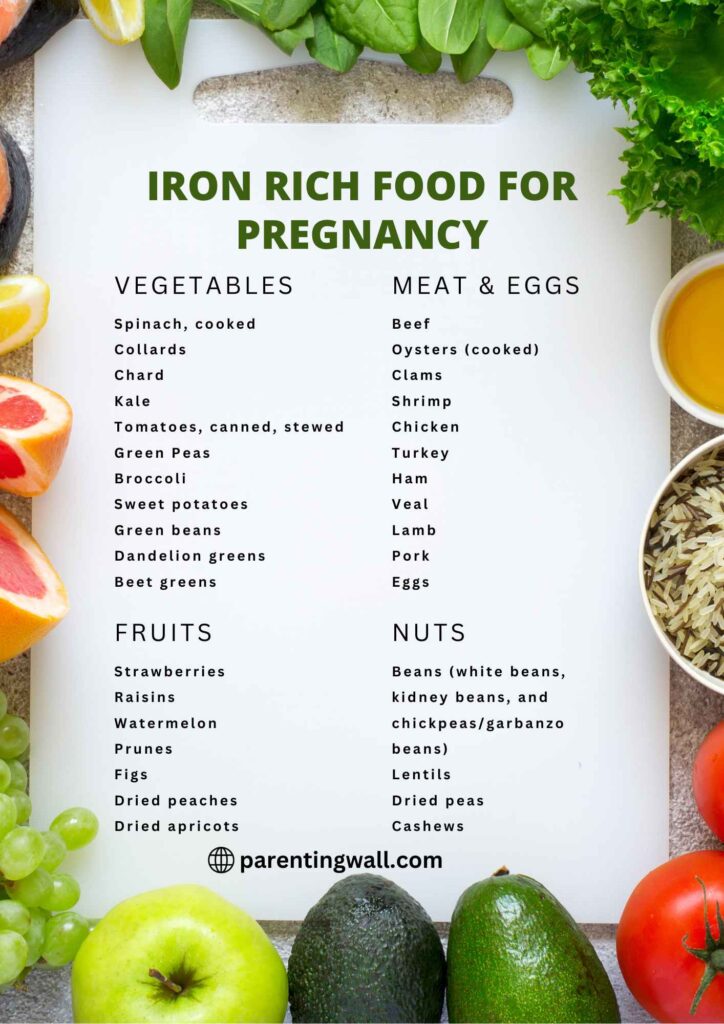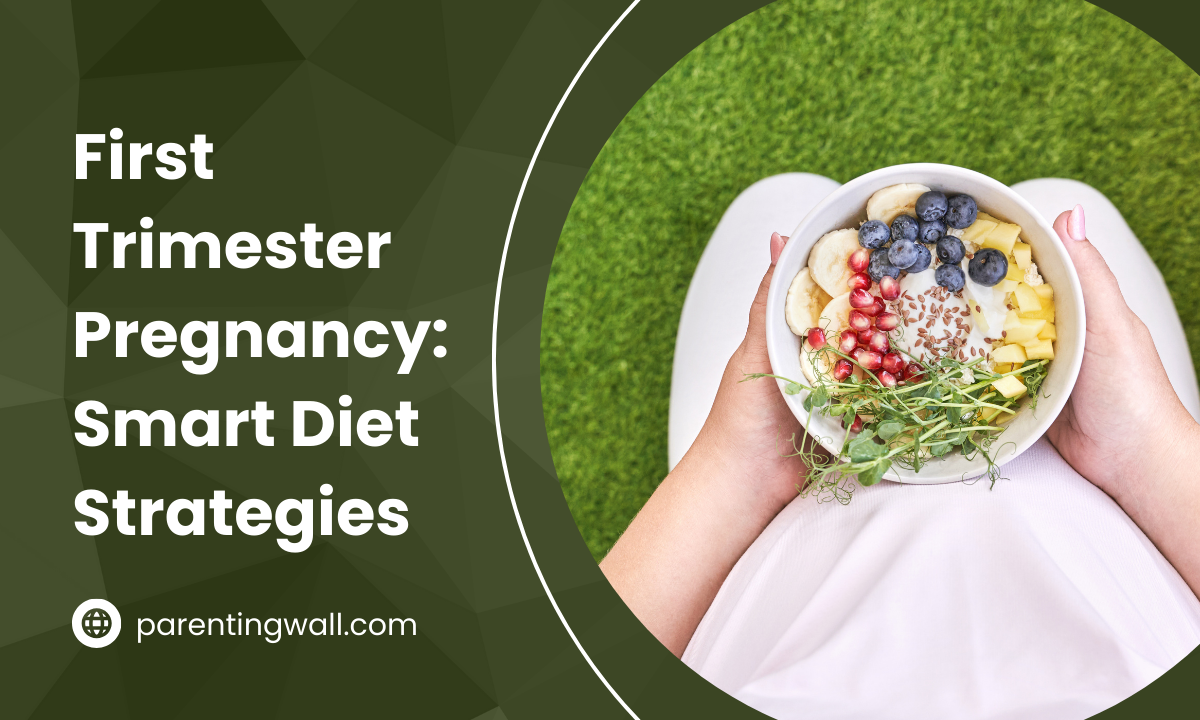The journey of pregnancy brings a lot of changes, specifically during the initial three months. This critical period lays down crucial groundwork for fetal development. Expectant mothers often seek strategies to nurture their growing baby while managing new dietary needs and challenges.
Catering to these unique requirements involves balancing nutrition by choosing wholesome foods and employing natural remedies that ease discomforts—all with an aim to support both maternal health and optimal embryo growth through those transformative first three months.
11 Strategies to Maintain a Healthy Diet During the First Trimester
As you know that sustaining a healthy diet is very much important for expectant mother and fetus development. Here is the 11 essential strategies to navigate the challenges of the initial months of pregnancy while promoting a balanced and nourishing diet.
1. First Trimester Nutritional Needs
In the first trimester, a baby’s foundation is laid down. A mother should aim for a minimum daily intake of 400 mcg of folic acid to help prevent birth defects in her growing child’s brain and spine. This crucial vitamin should be taken before conception and throughout pregnancy.
Foods rich in folate, like dark green vegetables – think broccoli or asparagus – are also key for natural intake alongside prenatal vitamins that typically contain the right amount of folic acid. Estrogen and progesterone surge during these early weeks causing nausea, but this nutrient can’t take a backseat; it supports neural tube formation essential for healthy development as soon as one knows about their pregnancy.
2. Managing Morning Sickness with Diet
For easing morning sickness with diet, women find eating small meals often helps. This tactic avoids an empty belly that may make nausea worse. Try dry bread or simple crackers right after waking up—such choices are good because rich in carbs and avoid oiliness, spice, or heavy sweetness.
Fatigue can heighten the discomfort of pregnancy-related nausea; thus rest is key too. Cooking smells sometimes trigger queasiness so it’s wise to have others cook if possible, or eat cold dishes when alone to cope better. If outside air brings relief from symptoms like vomiting and unease during early hours of motherhood-to-be life stages – fresh breezes offer help by carrying away indoor cooking odors which might otherwise prove challenging for sensitized pregnant senses.
Acupressure shows promise for some: a band worn on your arm can calm feelings of illness as it stimulates certain body responses linked with reducing these uneasy sensations.
3. Prioritizing Hydration and Water Intake
During pregnancy, a woman’s body requires more water to support the growing fetus and increased blood volume. The recommended intake is 8-10 glasses daily, essential for both amniotic fluid and fetal circulation. Water also aids in tooth and bone development due to its fluoride content but must be free from contaminants like lead which can harm the unborn child’s growth or even cause spontaneous abortion.
It absorbs efficiently in the small intestine with approximately 90% utilized by the body; thus regular sips throughout day are vital since our bodies cannot generate sufficient amounts internally. With caloric needs upped by about 300 calories starting second trimester, at least an extra 300 ml of fluids is crucial too.
4. Focusing on Small, Frequent Meals
Eating small meals becomes key for an expecting mother. One’s body may struggle with the usual three large feeds when their uterus grows, pressing on the stomach. It shifts to needing less food more often.
Such a pattern can ward off discomfort and aid digestion during these critical months. Moms-to-be should aim for balanced boosts of protein or healthy carbs throughout their day. Research shows women often miss the mark in pregnancy weight goals; too much or too little is common, impacting both mom and baby’s health post-birth significantly—proper nutrition aids in hitting that delicate balance just right.
5. Iron-Rich Foods for Energy
Eating iron-rich foods during pregnancy is key. Iron supports the baby’s brain growth and helps prevent anemia in mothers. Women typically fall short on iron intake, which matters more when expecting.
Boosting this mineral thwarts tiredness too. Lean meats, beans, peas, lentils aside are all rich in heme iron—the kind your body absorbs well. There’s non-heme iron in plants but munch with some vitamin C to soak it up better; orange juice or tomatoes can help here!
Remember variety—besides meat think spinach and tofu to hit those needs without monotony. Women who don’t eat much dairy or fish need iodine—which a shake of iodized salt sorts out quick—and counts for energy plus cell-building tasks that keep both mother and child strong throughout pregnancy stages.

6. Including Fiber in Your Daily Menu
Eating fiber-rich foods is vital for a mother’s meal plan. In rural Ethiopia, studies show pregnant women get much of their daily fiber from boiled cereals and coffee—making up 63%.
On average, Many of you may take in about 25 milligrams per gram each day; that’s not enough according to dietary guidelines. A diet full with fruits, vegetables, grains feeds moms the plant-based substances their body can’t digest but needs during pregnancy for health and comfort as it helps ease digestion troubles common at this time due to hormonal changes.
More diverse food choices could meet their growing demand for nutrients crucial in early child growth stages without forgetting the benefits beyond those tied solely to pregnancy like long-term well-being and disease risk reduction later on in life.
7. Balancing Macro Nutrients for Pregnancy Health
Balancing macro nutrients when expecting is vital. Protein supports fetal growth, yet too much has risks. Carbs modulate blood sugar; a low glycaemic index helps reduce diabetes risk and heavy babies.
Healthy fats are also key for development but should be monitored to avoid excess weight gain in obese women who may not need more energy intake during pregnancy. Micro nutrient balance is equally critical with folic acid crucial for preventing birth defects like neural tube issues. Iodine safeguards against cretinism while recent studies endorse calcium supplements, especially if there’s high hypertension risk or meager dietary calcium.
Despite advancements in maternal nutrition research, many pregnant moms still face vitamin shortages impacting both mother and child well into later years – highlighting the importance of fortified foods alongside tailored supplementation strategies for optimal prenatal health.
8. Handle Cravings Smartly
Cravings can start at the end of the first trimester. They often signal what nutrients your body needs, not just a taste for sweets or chocolate but perhaps magnesium those foods contain. Talk to a doctor about cravings and how to satisfy them with healthy options.
It’s okay sometimes to give into that chocolate craving! On the flip side, many women face food aversions during pregnancy towards items like meats or spicy dishes due to their strong flavors or texture issues; these too are typical responses as your body adapts through this time. Remember, while most cravings are safe, some foods should still be avoided despite intense desires for them.
9. The Importance of Prenatal Vitamins
Prenatal vitamins are essential; they pack nutrients vital for both baby and mother. Folic acid is key, halving the risk of neural tube defects like spina bifida. Ensuring enough iron supports increased blood volume that develops by the second trimester—helping oxygen reach the fetus and aiding mom’s energy levels.
Vitamin D aids in forming bones and eyesight, while calcium strengthens a growing baby’s skeleton. Vitamins B6 and C support skin, blood formation, and more—a must for fetal development. Elements like zinc prevent low birth weight; copper’s crucial too—for proper growth.
Keep this information close when considering your diet to nurture life within you successfully.
10. Safe Food Handling Practices Explained
When expecting, safe food handling is key. One must avoid raw fish sushi; cooked versions are okay though. Raw produce should be washed well under running water before it’s cut or eaten.
Always clean your hands and kitchen tools after you work with uncooked foods to prevent germs from spreading. You need to cook meats like beef, pork, or poultry until they reach a temperature that’s been checked by a thermometer—this ensures safety for both mom and baby. Regarding supplements: prenatal vitamins fill nutritional gaps but can’t substitute real food.
Experts say these pills shouldn’t replace meals full of healthy choices. Folic acid stands out in importance among other nutrients as it lowers the risk of serious birth defects affecting the brain and spine during those first crucial weeks when many don’t yet know they’re pregnant. To cover bases early on, start taking folic acid even before trying for a baby – this advice will likely come from health professionals who’ll also personalize dosage based on individual needs.
11. Meal Planning Strategies Simplified
In meal planning during the first trimester, one must focus on gradual weight gain to support baby growth without inviting risks like gestational diabetes or high blood pressure. Experts suggest that underweight women aim for 28-40 pounds; those at a healthy weight should target 25-35 pounds; overweight expectant mothers ought to limit it between 15-25 pounds. Those with obesity need only add an extra 11–20 pounds throughout pregnancy.
Health professionals emphasize steady gains about 1–4 lbs initially, then upping it slightly as weeks advance. Consultation with care providers sets personalized goals aligned with individual health needs – crucial for mother and child’s future well-being.
Navigating the first trimester can be challenging, but with mindful eating strategies, expectant mothers can lay a foundation for healthy development. Prioritizing a diet rich in fruits, vegetables, lean proteins and whole grains is essential. Small frequent meals help manage nausea while ensuring nutrient intake remains steady.
Staying hydrated eases morning sickness symptoms as well. For individual dietary needs or concerns during this critical phase of pregnancy, consulting with healthcare providers offers tailored guidance to support both the mother’s health and the baby’s growth.
Be Healthy and Happy!!
Related:



